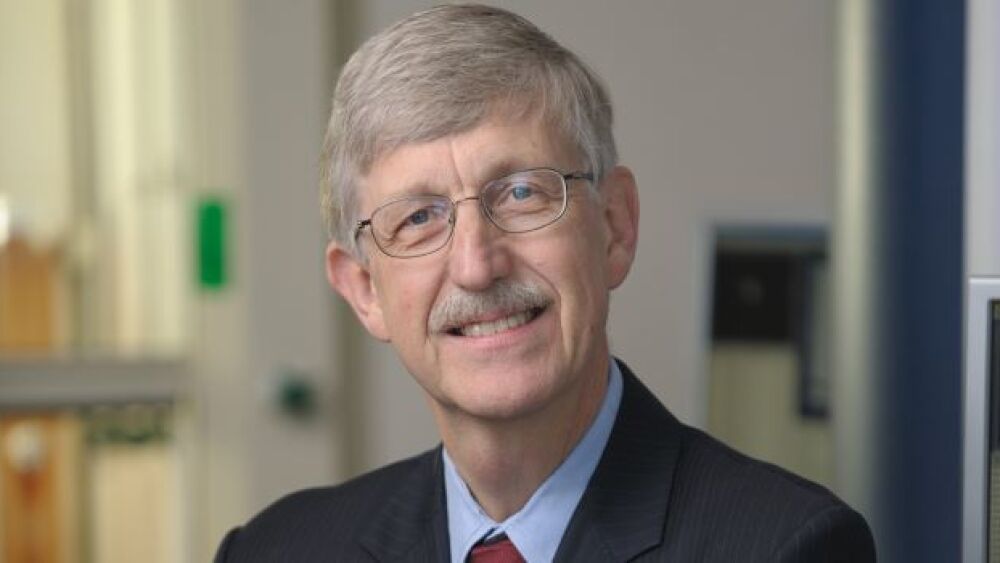While the president temporarily shores up leadership at the OSTP, the NIH is losing another long-time career researcher, John R. Mascola.
Francis Collins will serve as Science Advisor to President Biden/Photo courtesy Templeton Prize
Eric Lander’s abrupt resignation from the Biden administration following accusations of bullying created a temporary leadership vacuum at the government’s Office of Science and Technology Policy (OSTP) that has now been filled by not one, but two people, at least temporarily.
On Wednesday, the White House announced that OSTP Deputy Director for Science and Society Alondra Nelson will perform the duties of director of the OSTP. Francis Collins, the recently-retired head of the National Institutes of Health will serve as Science Advisor to the president and co-chair the President’s Council of Advisors on Science and Technology. Nelson and Collins will operate in these roles until permanent leadership is nominated and confirmed. The White House said these temporary appointments will allow the OSTP and the president’s agenda for science and technology to “move seamlessly forward under proven leadership.”
The two seasoned government officials will take over for Landers, who stepped down from his post last week following reports of bullying. The reports were confirmed following an internal investigation by the White House. As BioSpace previously reported, Lander, the president and founding director of the Broad Institute, a biomedical research organization founded by Harvard University and the Massachusetts Institute of Technology, bullied and spoke unkindly to several staff members, including his then-general counsel, Rachel Wallace. The investigation concluded that Lander had spoken “harshly and disrespectfully to colleagues in front of other colleagues.” Following the reports, Lander submitted his resignation to the president.
“I am devastated that I caused hurt to past and present colleagues by the way in which I have spoken to them,” Lander said in his resignation.
In the announcement naming Nelson and Collins, the White House said that President Biden has “doubled down on science.” By choosing the two experienced leaders, the administration said it is placing emphasis on the importance of a strong OSTP that can help drive science and technology solutions to some of the biggest challenges the nation faces. Additionally, the White House said having strong OSTP leadership will play a key role in several administration initiatives, including the creation of a new ARPA-H research and discovery agency, the building of support for a Cancer Moonshot 2.0, the search for a new head of the National Institutes of Health and the broad advisory work of the President’s Council of Advisors on Science and Technology.
As OSTP Deputy Director, Nelson has prioritized efforts to broaden participation in STEM fields, strengthen the U.S. research infrastructure and ensure equitable access to the benefits of new and emerging technologies and scientific innovation, the White House said.
Collins served as head of the NIH for 12 years, the longest-serving presidentially-appointed NIH director who served under three different administrations. He was awarded the Presidential Medal of Freedom in Nov. 2007.
While the president temporarily shores up leadership at the OSTP, the NIH is losing another long-time career researcher. John R. Mascola, the director of the Vaccine Research Center at the National Institute of Allergy and Infectious Diseases, is stepping down at the end of March.
Mascola, who joined the NIAID in 2000, led the NIH team that collaborated with Moderna on the development of that company’s COVID-19 vaccine. The Moderna vaccine was based on stabilized spike protein technology developed by Mascola and his team, Anthony Fauci, director of the NIAID said.
“This same technology is now being used in other COVID-19 vaccines, and the concept of structure-based vaccine design is also being investigated for its potential in vaccines against other diseases. Additionally, Dr. Mascola led the VRC’s efforts to develop monoclonal antibodies for use in treating COVID-19,” Fauci said in a statement.
Under the direction of Mascola, NIH vaccine researchers developed investigational vaccines and antibody products against other significant public health threats such as Zika, chikungunya, respiratory syncytial virus, Ebola, Marburg, and malaria. He and his colleagues also identified and developed for clinical use potent antibodies for the potential treatment and prevention of HIV.
Following Mascola’s departure, Richard Koup, the current deputy director of the vaccine research center, will serve as acting director pending a nationwide search for a replacement.





